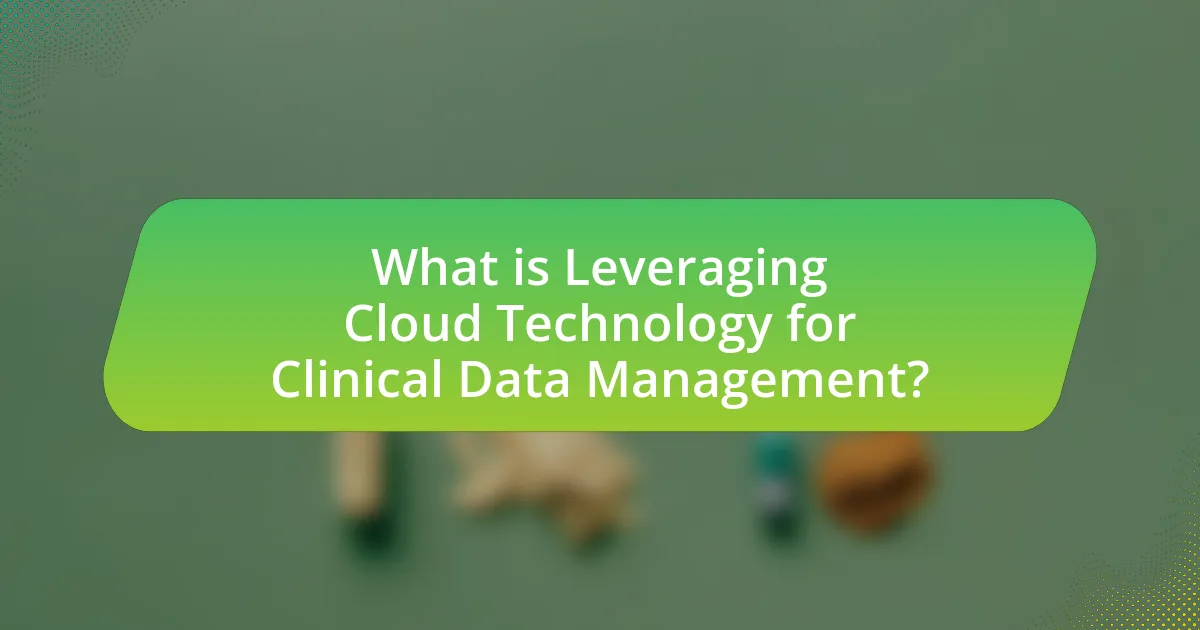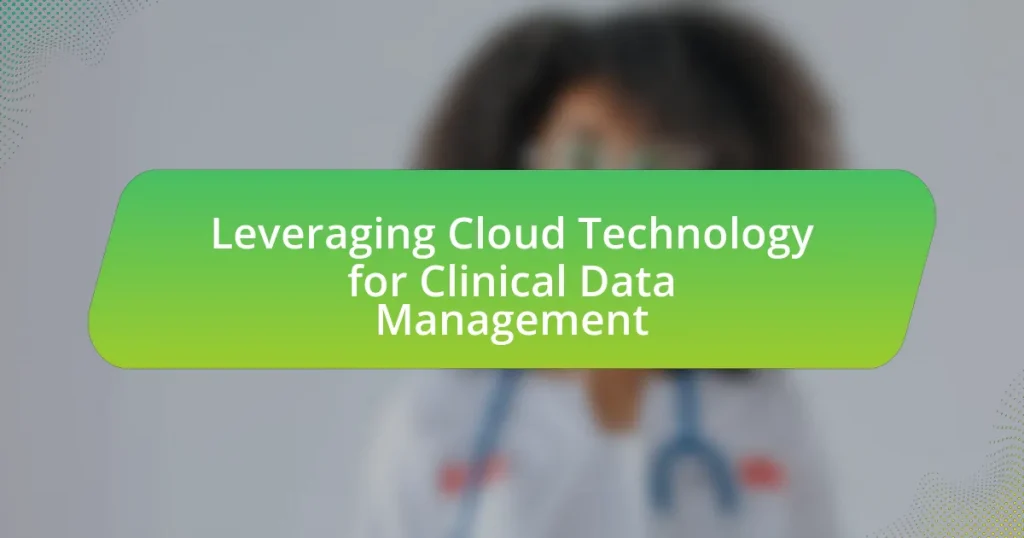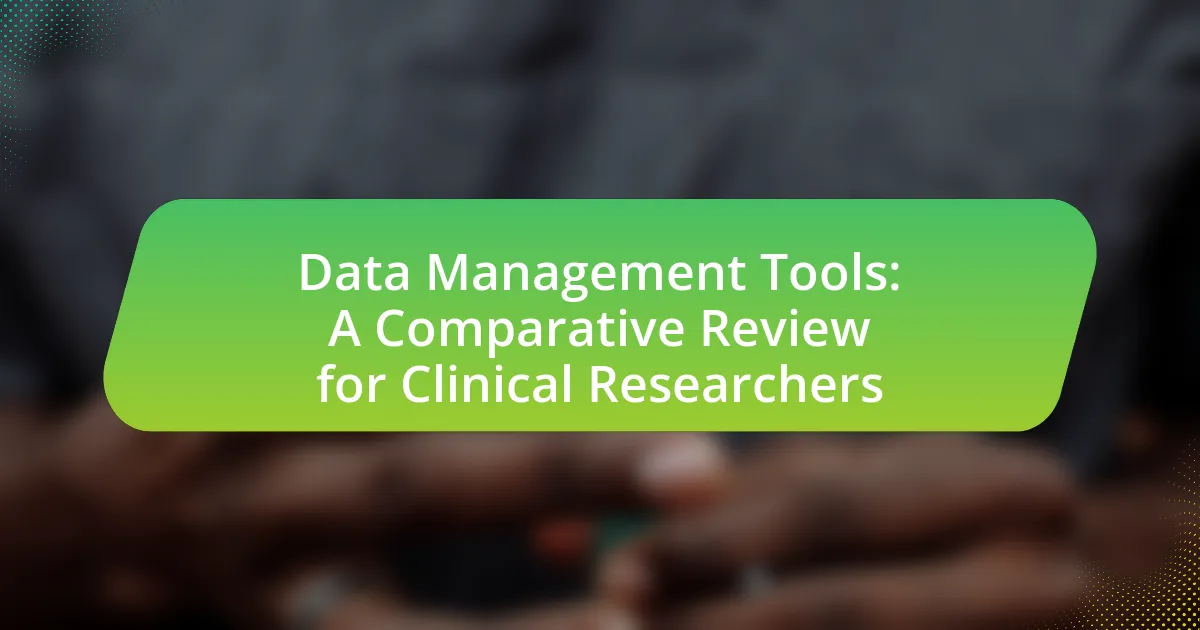Leveraging cloud technology for clinical data management involves utilizing cloud computing resources to efficiently and securely store, process, and analyze clinical data. This approach enhances data accessibility, scalability, and collaboration among healthcare professionals, facilitating real-time data sharing and analysis. Key features of cloud technology include improved data security, compliance with regulations, and cost-effectiveness, which collectively address challenges such as data integrity and integration. The article also explores the benefits of cloud solutions, including reduced operational costs and enhanced data analysis capabilities, while outlining best practices for successful implementation and future trends in the field.

What is Leveraging Cloud Technology for Clinical Data Management?
Leveraging cloud technology for clinical data management involves utilizing cloud computing resources to store, process, and analyze clinical data efficiently and securely. This approach enhances data accessibility, scalability, and collaboration among healthcare professionals, enabling real-time data sharing and analysis. According to a report by the Healthcare Information and Management Systems Society (HIMSS), 83% of healthcare organizations have adopted cloud solutions to improve data management and patient care. This statistic underscores the growing reliance on cloud technology in the healthcare sector for managing clinical data effectively.
How does cloud technology enhance clinical data management?
Cloud technology enhances clinical data management by providing scalable storage, improved data accessibility, and enhanced collaboration among healthcare professionals. This technology allows for the secure storage of vast amounts of clinical data, which can be accessed in real-time from various locations, facilitating timely decision-making. Additionally, cloud platforms often incorporate advanced analytics tools that enable healthcare organizations to derive insights from data, improving patient outcomes and operational efficiency. For instance, a study published in the Journal of Medical Internet Research found that cloud-based solutions significantly reduced data retrieval times and improved data sharing capabilities among clinical teams, demonstrating the effectiveness of cloud technology in streamlining clinical data management processes.
What are the key features of cloud technology in this context?
The key features of cloud technology in the context of clinical data management include scalability, accessibility, data security, and cost-effectiveness. Scalability allows healthcare organizations to adjust resources based on demand, facilitating the management of large volumes of clinical data. Accessibility ensures that authorized personnel can access data from anywhere, enhancing collaboration among healthcare providers. Data security features, such as encryption and compliance with regulations like HIPAA, protect sensitive patient information. Cost-effectiveness is achieved through reduced infrastructure costs and pay-as-you-go pricing models, which are particularly beneficial for healthcare organizations managing fluctuating data needs. These features collectively enhance the efficiency and effectiveness of clinical data management.
How does cloud technology improve data accessibility and sharing?
Cloud technology enhances data accessibility and sharing by enabling centralized storage and real-time collaboration across multiple devices and locations. This centralized approach allows authorized users to access and share data seamlessly, regardless of their physical location, which is crucial in clinical data management where timely information is essential for patient care. According to a study published in the Journal of Medical Internet Research, cloud-based systems can reduce data retrieval times by up to 50%, significantly improving workflow efficiency in healthcare settings. Additionally, cloud technology supports secure data sharing through encryption and access controls, ensuring that sensitive clinical information is protected while remaining readily available to healthcare professionals when needed.
What are the primary challenges in clinical data management?
The primary challenges in clinical data management include data integrity, regulatory compliance, and data integration. Data integrity is crucial as inaccuracies can lead to erroneous conclusions in clinical trials; for instance, a study published in the Journal of Clinical Trials highlighted that 30% of clinical trial data contained errors that could compromise results. Regulatory compliance poses challenges due to the need to adhere to strict guidelines from agencies like the FDA and EMA, which require meticulous documentation and reporting. Additionally, data integration is complex as clinical data often comes from diverse sources, including electronic health records and laboratory systems, making it difficult to consolidate and analyze effectively. These challenges necessitate robust strategies and technologies to ensure accurate and compliant clinical data management.
How can cloud technology address data security concerns?
Cloud technology can address data security concerns by implementing advanced encryption methods, access controls, and compliance with regulatory standards. These measures ensure that sensitive data is protected both in transit and at rest, significantly reducing the risk of unauthorized access. For instance, cloud providers often utilize AES-256 encryption, which is recognized as a strong standard for securing data. Additionally, cloud services frequently offer multi-factor authentication and role-based access controls, which further enhance security by ensuring that only authorized personnel can access sensitive information. Compliance with regulations such as HIPAA for healthcare data management also mandates stringent security protocols, providing an additional layer of protection for clinical data.
What role does cloud technology play in regulatory compliance?
Cloud technology plays a crucial role in regulatory compliance by providing secure data storage, facilitating real-time data access, and ensuring adherence to industry standards. By utilizing cloud solutions, organizations can implement robust security measures, such as encryption and access controls, which are essential for protecting sensitive clinical data and meeting regulatory requirements like HIPAA and GDPR. Furthermore, cloud platforms often include compliance certifications and audit trails that simplify the process of demonstrating compliance during regulatory reviews. This integration of technology not only enhances data integrity but also streamlines reporting and documentation processes, making it easier for organizations to maintain compliance with evolving regulations in clinical data management.
What are the benefits of using cloud technology for clinical data management?
The benefits of using cloud technology for clinical data management include enhanced data accessibility, improved collaboration, and increased scalability. Cloud technology allows healthcare professionals to access clinical data from any location with internet connectivity, facilitating real-time decision-making and patient care. Additionally, it enables multiple stakeholders, such as researchers and clinicians, to collaborate seamlessly on data analysis and sharing, which can accelerate research and improve outcomes. Furthermore, cloud solutions can easily scale to accommodate growing data volumes and user demands, ensuring that organizations can adapt to changing needs without significant infrastructure investments. According to a report by Gartner, organizations that adopt cloud solutions can reduce IT costs by up to 30%, demonstrating the financial efficiency of cloud technology in managing clinical data.
How does cloud technology reduce operational costs?
Cloud technology reduces operational costs by enabling organizations to pay only for the resources they use, eliminating the need for significant upfront investments in hardware and infrastructure. This model, known as pay-as-you-go, allows businesses to scale their IT resources according to demand, which can lead to substantial savings. For instance, a study by Gartner indicates that organizations can save up to 30% on IT costs by migrating to cloud services, as they reduce expenses related to maintenance, energy consumption, and staffing for on-premises systems. Additionally, cloud solutions often come with built-in security and compliance features, further decreasing the costs associated with managing these aspects independently.
What impact does cloud technology have on data analysis and reporting?
Cloud technology significantly enhances data analysis and reporting by providing scalable storage, real-time processing capabilities, and improved collaboration. This technology allows organizations to store vast amounts of data securely and access it from anywhere, facilitating timely analysis and reporting. For instance, according to a report by Gartner, organizations leveraging cloud analytics can achieve a 30% reduction in time spent on data preparation, leading to faster insights. Additionally, cloud platforms often integrate advanced analytics tools, enabling users to perform complex analyses without the need for extensive IT resources. This results in more accurate and actionable reporting, ultimately improving decision-making processes in clinical data management.
How can organizations transition to cloud-based clinical data management?
Organizations can transition to cloud-based clinical data management by adopting a structured approach that includes assessing current data management practices, selecting a suitable cloud provider, and implementing necessary training for staff. This transition begins with a thorough evaluation of existing systems to identify gaps and requirements, ensuring that the chosen cloud solution meets regulatory compliance and data security standards. Selecting a cloud provider with a proven track record in healthcare data management is crucial; for instance, providers like Amazon Web Services and Microsoft Azure offer specialized services tailored for clinical data. Additionally, training staff on new cloud technologies and workflows is essential to facilitate a smooth transition and maximize the benefits of cloud-based systems. According to a report by Gartner, organizations that effectively implement cloud solutions can achieve up to 30% cost savings and improved data accessibility, reinforcing the value of transitioning to cloud-based clinical data management.
What are the best practices for implementing cloud technology in clinical data management?
The best practices for implementing cloud technology in clinical data management include ensuring data security, selecting a compliant cloud provider, and establishing clear data governance policies. Data security is critical; organizations must utilize encryption and access controls to protect sensitive patient information. Choosing a cloud provider that complies with regulations such as HIPAA ensures that the data management practices meet legal standards. Additionally, implementing robust data governance policies helps maintain data integrity and facilitates effective data sharing among stakeholders. These practices are supported by industry standards and guidelines, such as those outlined by the FDA and the Cloud Security Alliance, which emphasize the importance of security and compliance in healthcare data management.
What steps should be taken to ensure a smooth migration to the cloud?
To ensure a smooth migration to the cloud, organizations should follow a structured approach that includes assessment, planning, execution, and optimization. First, conducting a thorough assessment of existing infrastructure and applications is essential to identify what can be migrated and what needs to be re-engineered. According to a report by Gartner, 83% of enterprise workloads will be in the cloud by 2020, highlighting the importance of strategic planning in cloud migration.
Next, organizations should develop a detailed migration plan that outlines timelines, resource allocation, and risk management strategies. This plan should include selecting the right cloud service provider based on specific needs, such as compliance with healthcare regulations, which is critical for clinical data management.
During execution, it is vital to implement a phased migration approach, starting with less critical applications to minimize disruption. A study by McKinsey indicates that organizations that adopt a phased approach can reduce migration costs by up to 30%.
Finally, after migration, continuous optimization and monitoring of cloud resources are necessary to ensure performance and cost-effectiveness. Regularly reviewing cloud usage and adjusting resources can lead to significant savings and improved efficiency, as evidenced by a report from Flexera, which states that 35% of cloud spend is wasted due to underutilized resources.
How can organizations train staff to effectively use cloud-based systems?
Organizations can train staff to effectively use cloud-based systems by implementing structured training programs that include hands-on workshops, online courses, and continuous support. These programs should focus on practical applications of cloud technologies, ensuring that employees understand both the theoretical and operational aspects of the systems. For instance, a study by Gartner indicates that organizations that invest in comprehensive training see a 30% increase in employee productivity when using cloud solutions. Additionally, providing access to resources such as user manuals, FAQs, and dedicated support teams can enhance staff confidence and proficiency in utilizing cloud-based systems.
What are the future trends in cloud technology for clinical data management?
Future trends in cloud technology for clinical data management include increased adoption of artificial intelligence and machine learning for data analysis, enhanced data security measures, and the integration of real-time data processing capabilities. These advancements aim to improve data accessibility, streamline workflows, and ensure compliance with regulatory standards. For instance, a report by Gartner predicts that by 2025, 75% of organizations will use AI in their cloud-based data management systems, significantly enhancing decision-making processes in clinical settings. Additionally, the rise of hybrid cloud solutions allows for greater flexibility and scalability, enabling healthcare organizations to manage vast amounts of clinical data more efficiently.
How might artificial intelligence integrate with cloud technology in this field?
Artificial intelligence can integrate with cloud technology in clinical data management by enabling real-time data analysis and predictive analytics. This integration allows healthcare providers to process large volumes of clinical data stored in the cloud, facilitating improved decision-making and personalized patient care. For instance, AI algorithms can analyze patient records and treatment outcomes to identify trends and predict future health risks, enhancing the overall efficiency of clinical workflows. Additionally, cloud-based AI solutions can scale resources dynamically, accommodating varying data loads and ensuring that healthcare organizations can manage their data effectively while maintaining compliance with regulations such as HIPAA.
What innovations are expected to emerge in cloud-based clinical data solutions?
Innovations expected to emerge in cloud-based clinical data solutions include enhanced data interoperability, advanced analytics capabilities, and improved patient data security. Enhanced data interoperability will facilitate seamless sharing of clinical data across different healthcare systems, enabling better collaboration among providers. Advanced analytics capabilities, powered by artificial intelligence and machine learning, will allow for real-time insights and predictive modeling, improving decision-making in clinical settings. Improved patient data security will be achieved through advanced encryption methods and compliance with regulations such as HIPAA, ensuring that sensitive information is protected while still being accessible for authorized use. These innovations are driven by the increasing demand for efficient, secure, and integrated healthcare solutions.
What practical tips can organizations follow for successful cloud adoption in clinical data management?
Organizations can achieve successful cloud adoption in clinical data management by implementing a structured approach that includes assessing their current infrastructure, ensuring compliance with regulations, and investing in training for staff. First, conducting a thorough assessment of existing systems helps identify gaps and opportunities for integration with cloud solutions. Compliance with regulations such as HIPAA and GDPR is crucial, as it ensures that patient data is protected and that the organization meets legal requirements. Additionally, providing comprehensive training for staff on cloud technologies and data management practices enhances user adoption and minimizes errors. These strategies are supported by industry reports indicating that organizations that prioritize compliance and training see a 30% increase in successful cloud implementation outcomes.






